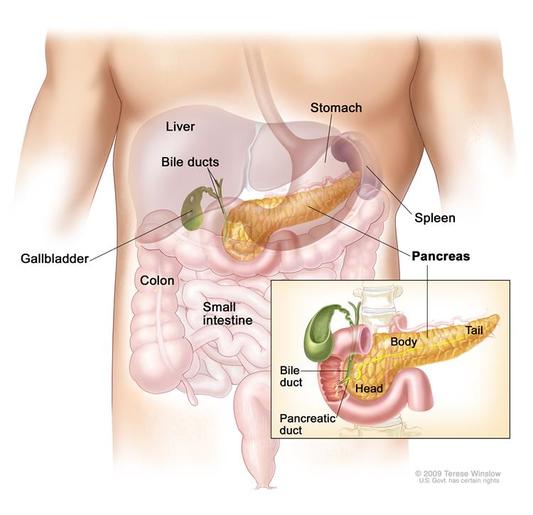Pancreatic cancer is one of the deadliest types of cancer, usually. I say usually, because ~95% of pancreatic tumors are classified as "pancreatic ductal adenocarcinoma", and these really are very serious tumors. The remaining ~5% of cases are tumors that start in the pancreas but are qualitatively different (either they have different genetic mutations or they originate from a different cell type within the pancreas). Some of these less common pancreatic tumors have better outcomes than ductal adenocarcinoma, though some can also be very serious. However, the focus of the Olive Laboratory is Pancreatic Ductal Adenocarcinoma (PDA), and all of the discussions on this site will focus on this type of pancreatic cancer.
Pancreatic cancer occurs when the cells that make up the exocrine compartment of the pancreas begin to grow and divide when they should not. These can lead to "pre-cancerous lesions", which are aberrant growths that are not yet cancer, but could become cancer someday. Some of these lesions form fluid-filled cysts that can be detected by imaging technologies such as CT or MRI, if they grow large enough. Others types of pre-cancerous lesions are smaller and cannot be detected by any current technology. A major area of research is to develop a blood test or other simple test to identify people who have these pre-cancerous lesions before they become cancer.
At some point, the cells that make up a pre-cancerous lesion may start to push outward into other parts of the pancreas, infiltrating the normal tissue. This is what distinguishes cancer from pre-cancer. The cells form an expanding ball within the pancreas called the "primary tumor" or "primary site". This tumor can cause trouble by itself, by blocking off the ducts that deliver enzymes to the intestine, by causing the rest of the pancreas to fail (thereby causing diabetes), by wrapping around blood vessels, or by bumping into other organs. It can also wreak havoc on the body's metabolism which can result in a wasting disease called cachexia. However, the most dangerous process is when the tumor cells spread through the rest of the body and form new masses in other organs. This process is called metastasis, and it is the acute cause of death in two thirds of pancreatic cancer patients.
Listed below are links to a number of topics within pancreatic cancer, each with a non-technical explanation. More topics will be added over time, and I'm certainly happy to entertain suggestions! Just email me: [email protected].
Pancreatic cancer occurs when the cells that make up the exocrine compartment of the pancreas begin to grow and divide when they should not. These can lead to "pre-cancerous lesions", which are aberrant growths that are not yet cancer, but could become cancer someday. Some of these lesions form fluid-filled cysts that can be detected by imaging technologies such as CT or MRI, if they grow large enough. Others types of pre-cancerous lesions are smaller and cannot be detected by any current technology. A major area of research is to develop a blood test or other simple test to identify people who have these pre-cancerous lesions before they become cancer.
At some point, the cells that make up a pre-cancerous lesion may start to push outward into other parts of the pancreas, infiltrating the normal tissue. This is what distinguishes cancer from pre-cancer. The cells form an expanding ball within the pancreas called the "primary tumor" or "primary site". This tumor can cause trouble by itself, by blocking off the ducts that deliver enzymes to the intestine, by causing the rest of the pancreas to fail (thereby causing diabetes), by wrapping around blood vessels, or by bumping into other organs. It can also wreak havoc on the body's metabolism which can result in a wasting disease called cachexia. However, the most dangerous process is when the tumor cells spread through the rest of the body and form new masses in other organs. This process is called metastasis, and it is the acute cause of death in two thirds of pancreatic cancer patients.
Listed below are links to a number of topics within pancreatic cancer, each with a non-technical explanation. More topics will be added over time, and I'm certainly happy to entertain suggestions! Just email me: [email protected].

